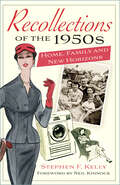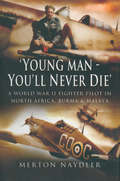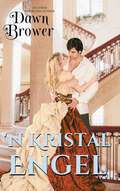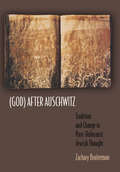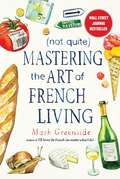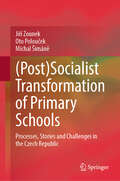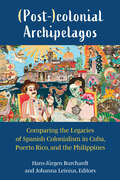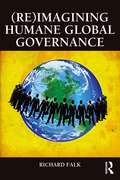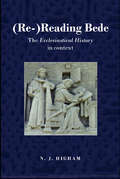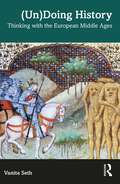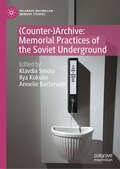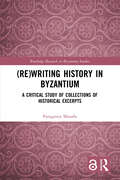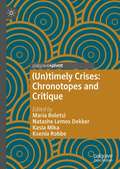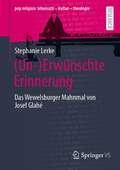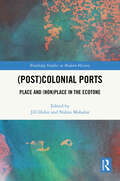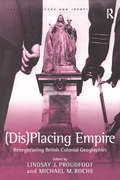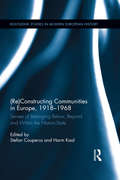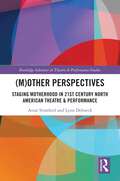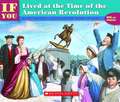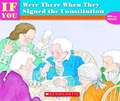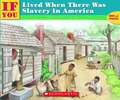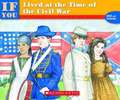- Table View
- List View
'You've Never Had It So Good!': Memories and Recollections of Life in the 1950s
by Stephen F Kelly Neil KinnockThe 1950s saw a major shift in the lifestyles of many in Britain. The austerity that had dogged the 1940s after the end of the Second World War began to give way to better times. Employment levels rose to new heights, white consumer goods appeared in shop windows for the first time, television replaced the radio in most homes, rock and roll was born, the National Health Service provided free health care to the nation, more children went to grammar schools, leisure time increased, families went on holiday, and the new Queen was crowned — bringing in a glorious new Elizabethan age.Including interviews with former Labour leader Lord Neil Kinnock, footballers Bobby Charlton, Wilf McGuinness and Terry Venables, radio producer, author and journalist Clare Jenkins, and the eminent historian Lord Peter Hennessy, among others, this delightful compendium of reminiscences will appeal to all who grew up in this post-war decade, whether in town or country, wealth or poverty. With chapters on schooldays, TV and radio, trips to the seaside, music and fashion, these wonderful stories are sure to jog the memories of all who remember this exciting era.
'Young Man, You'll Never Die': A World War II Fighter Pilot In North Africa, Burma & Malaya (Reminiscence Ser.)
by Merton NaydlerA British Royal Air Force pilot recounts fighting over African deserts and Asian jungles during World War II in this military memoir. Merton Naydler joined the RAF at the age of nineteen and served for the next six years until May 1946. He flew Spitfires and Hurricanes during a tour of duty that took him to North Africa, Burma, and Malaya. This well written and extremely entertaining memoir portrays wartime life in the desert environment where sand, flies, life under canvas made living and flying a daunting experience. When Naydler was posted to Burma he was filled with &“a deep and genuine dread.&” After a long uncomfortable trip, he joined 11 Squadron and was then faced with Japanese Zeroes in combat over dense tropical jungle rather than Bf 109s over a barren desert terrain. &“Daytime flying was hot as hell, the humidity intense&”—the author&’s description of his new posting that goes on to describe life in &“Death Valley,&” named because of the likeliness of falling victim to tropical disease rather than enemy aircraft . . . This is the story of a sergeant pilot who learned his trade the hard way in action over Africa and then honed his combat skills in the skies over Japanese-held tropical forests where he was eventually commissioned.
'n Kristal Engel
by Dawn Brower’n Dronk belofte van verlowing het Thor se familie teen hom gedraai. Sal Thor Pia se vergifnis verdien en hulle weghardlopende kinders betyds vir Kersfees vind? Na 'n nag van kaarte en drinkery, was Thor se skeurende hoofpyn die minste van sy bekommernisse. Wanneer 'n boodskapper opdaag met 'n kontrak vir hom om te teken, ontdek sy vrou Pia hy het ingestem om hulle seun aan die graaf van Devon se dogter te verloof. Pia is verby woedend en eis dat hy dit regmaak—of anders. Nadat hulle die argument tussen hulle ouers gehoor het, besluit die tweeling Liam en Lily om weg te hardloop uit protes teen die kontrak. Thor en Pia gaan op soek na hulle opstandige kinders voordat iets verskrikliks met hulle gebeur. Sal Thor Pia oortuig om hom te vergewe en die tweeling voor Kersfees te vind, of sal hulle gesin vir altyd uitmekaar val?
(God) After Auschwitz: Tradition and Change in Post-Holocaust Jewish Thought
by Zachary BraitermanThe impact of technology-enhanced mass death in the twentieth century, argues Zachary Braiterman, has profoundly affected the future shape of religious thought. In his provocative book, the author shows how key Jewish theologians faced the memory of Auschwitz by rejecting traditional theodicy, abandoning any attempt to justify and vindicate the relationship between God and catastrophic suffering. The author terms this rejection "Antitheodicy," the refusal to accept that relationship. It finds voice in the writings of three particular theologians: Richard Rubenstein, Eliezer Berkovits, and Emil Fackenheim. This book is the first to bring postmodern philosophical and literary approaches into conversation with post-Holocaust Jewish thought. Drawing on the work of Mieke Bal, Harold Bloom, Jacques Derrida, Umberto Eco, Michel Foucault, and others, Braiterman assesses how Jewish intellectuals reinterpret Bible and Midrash to re-create religious thought for the age after Auschwitz. In this process, he provides a model for reconstructing Jewish life and philosophy in the wake of the Holocaust. His work contributes to the postmodern turn in contemporary Jewish studies and today's creative theology.
(North Carolina) American Anthem
by Edward L. Ayers Robert D. Schulzinger Jesús F. de la Teja Deborah Gray WhiteNIMAC-sourced textbook
(Not Quite) Mastering the Art of French Living
by Mark GreensideEvery year upon arriving in Plobien, the small Breton town where he spends his summers, American writer Mark Greenside picks back up where he left off with his faux-pas–filled Francophile life. Mellowed and humbled, but not daunted (OK, slightly daunted), he faces imminent concerns: What does he cook for a French person? Who has the right-of-way when entering or exiting a roundabout? Where does he pay for a parking ticket? And most dauntingly of all, when can he touch the tomatoes? Despite the two decades that have passed since Greenside’s snap decision to buy a house in Brittany and begin a bi-continental life, the quirks of French living still manage to confound him. Continuing the journey begun in his 2009 memoir about beginning life in France, (Not Quite) Mastering the Art of French Living details Greenside’s daily adventures in his adopted French home, where the simplest tasks are never straightforward but always end in a great story. Through some hits and lots of misses, he learns the rules of engagement, how he gets what he needs—which is not necessarily what he thinks he wants—and how to be grateful and thankful when (especially when) he fails, which is more often than he can believe. Introducing the English-speaking world to the region of Brittany in the tradition of Peter Mayle’s homage to Provence, Mark Greenside’s first book, I’ll Never Be French, continues to be among the bestselling books about the region today. Experienced Francophiles and armchair travelers alike will delight in this new chapter exploring the practical and philosophical questions of French life, vividly brought to life by Greenside’s humor and affection for his community.
(Post)Socialist Transformation of Primary Schools: Processes, Stories and Challenges in the Czech Republic
by Jiří Zounek Oto Polouček Michal ŠimáněThis book addresses the transformation of primary education in the former Czechoslovakia (now the Czech Republic) after the fall of the communist regime in 1989. It follows the overall transformation of education and school policy and offers original insights into the everyday life of the schools at that time. It also provides a unique perspective on the whole transformation process. The work discusses the school environment in the context of specific local characteristics, such as parents, community, regional institutions, and national and international contexts. The book specifically focuses on the changes in primary school management in terms of economics, organization, and personnel. The processes of pedagogical change are an essential theme of the book. They cover how teachers proceeded through the changes in their work at the time of the transformation and the reasons for their resistance to change, including the challenges that the transformation introduced into their work and personal lives. The book also monitors how the teachers navigated the selection and use of new textbooks and tools, such as digital tools. The work originates in historical-pedagogical research, based primarily on the oral history method and complemented by the study of contemporary documents.
(Post-)colonial Archipelagos: Comparing the Legacies of Spanish Colonialism in Cuba, Puerto Rico, and the Philippines
by Johanna Leinius Hans-Jürgen BurchardtThe Puerto Rican debt crisis, the challenges of social, political, and economic transition in Cuba, and the populist politics of Duterte in the Philippines—these topics are typically seen as disparate experiences of social reality. Though these island territories were colonized by the same two colonial powers—by the Spanish Empire and, after 1898, by the United States—research in the fields of history and the social sciences rarely draws links between these three contexts. Located at the intersection of Postcolonial Studies, Latin American Studies, Caribbean Studies, and History, this interdisciplinary volume brings together scholars from the US, Europe, Latin America, the Caribbean, and the Philippines to examine the colonial legacies of the three island nations of Cuba, Puerto Rico, and the Philippines. Instead of focusing on the legacies of US colonialism, the continuing legacies of Spanish colonialism are put center-stage. The analyses offered in the volume yield new and surprising insights into the study of colonial and postcolonial constellations that are of interest not only for experts, but also for readers interested in the social, political, economic, and cultural dynamics of Cuba, Puerto Rico, and the Philippines during Spanish colonization and in the present. The empirical material profits from a rigorous and systematic analytical framework and is thus easily accessible for students, researchers, and the interested public alike.
(Re)Imagining Humane Global Governance
by Richard FalkIn this important and path-breaking book, esteemed scholar and public intellectual Richard Falk explores how we can re-imagine the system of global governance to make it more ethical and humane. Divided into three parts, this book firstly scrutinizes the main aspects of Global Governance including, Geopolitics, The Future of International law, Climate Change and Nuclear weapons, 9/11, Global Democracy and the UN. In the last part, Falk moves the discussion on to the search for Progressive Politics, the Israel/Palestinian conflict and the World Order Models Project. Drawing on, but also rethinking the normative tradition in international relations, he examines the urgent challenges that we must face to counter imperialism, injustice, global poverty, militarism and environmental disaster. In so doing, he outlines the radical reforms that are needed on an institutional level and within global civil society if we are to realize the dream of a world that is more just, equitable and peaceful. This important work will be of interest to all students and scholars of global politics and international relations.
(Re)Visualizing National History
by Robin OstowIdeas regarding the role of the museum have become increasingly contentious. In the last fifteen years, scholars have pointed to ways in which states (especially imperialist states) use museums to showcase looted artefacts, to document their geographic expansion, to present themselves as the guardians of national treasure, and to educate citizens and subjects. At the same time, a great deal of attention has been paid to reshaping national histories and values in the wake of the collapse of the Communist bloc and the emergence of the European Union. (Re)Visualizing National History considers the wave of monument and museum building in Europe as part of an attempt to forge consensus in politically unified but deeply divided nations.This collection explores ways in which museums exhibit emerging national values and how the establishment of these new museums (and new exhibits in older museums) reflects the search for a consensus among different generational groups in Europe and North America. The contributors come from a variety of countries and academic backgrounds, and speak from such varied perspectives as cultural studies, history, anthropology, sociology, and museum studies. (Re)Visualizing National History is a unique and interdisciplinary volume that offers insights on the dilemmas of present-day European culture, manifestations of nationalism in Europe, and the debates surrounding museums as sites for the representation of politics and history.
(Re-)Reading Bede: The Ecclesiastical History in Context
by N.J. HighamBede's Ecclesiastical History is the most important single source for early medieval English history. Without it, we would be able to say very little about the conversion of the English to Christianity, or the nature of England before the Viking Age. Bede wrote for his contemporaries, not for a later audience, and it is only by an examination of the work itself that we can assess how best to approach it as a historical source. N.J. Higham shows, through a close reading of the text, what light the Ecclesiastical History throws on the history of the period and especially on those characters from seventh- and early eighth-century England whom Bede either heroized, such as his own bishop, Acca, and kings Oswald and Edwin, or villainized, most obviously the British king Cædwalla but also Oswiu, Oswald's brother. In (Re-)Reading Bede, N.J. Higham offers a fresh approach to how we should engage with this great work of history. He focuses particularly on Bede's purposes in writing it, its internal structure, the political and social context in which it was composed and the cultural values it betrays, remembering always that our own approach to Bede has been influenced to a very great extent by the various ways in which he has been both used, as a source, and commemorated, as man and saint, across the last 1,300 years.
(Un)Doing History: Thinking with the European Middle Ages
by Vanita SethAgainst the grain of much contemporary scholarship within medieval studies, this work emphasizes the radical alterity and historical rupture that the Middle Ages represents in European history.Through an engagement with three contentious debates in medieval studies – historiography, race and individuated subjectivity – Vanita Seth’s work employs postcolonial and postmodern theorizing to explore questions of ontology, epistemology, facial privileging, and emotion and identity in the European Middle Ages and early modern period. While the subject matter of this book is historical, the stakes are contemporary and political. Seth’s contention is that it is the very alterity that the medieval represents that enables contemporary scholars and activists to recognize as historical that which is so often posited as ‘natural.’ Writing a history of absence while also engaging radically different ways of being in the world, this book argues, helps to disrupt the self-evident naturalization of the face, to contest knee-jerk celebrations of individuality tethered to the human visage, and to recognize racism not as an age-old nemesis but as a distinctly modern form of organizing power.This work is interdisciplinary, engaging scholarship in science studies, philosophy, feminist theory, anthropology, race studies and literature, and postmodernand postcolonial theory. It presumes no prior specialized knowledge in medieval studies and/or history. This book is an essential reading for scholars and students in the fields of medieval and early modern history, race, historiography, identity and emotion studies.
**Missing** (Palgrave Macmillan Memory Studies)
by Klavdia Smola Ilya Kukulin Annelie BachmaierThis book is the first major study exploring archival and memorial practices of the Soviet unofficial culture. The creation of counter-archives was one of the most important forms of cultural resistance in the Soviet Union. Unofficial artists and poets had to reinvent the possibilities of maintaining art and literature that “did not exist”. Against the background of archival theories and memory studies, the volume explores how the culture of the Soviet underground has become one of the most striking cases of scholarly and artistic (self-)archiving, which – although being half-isolated from the outer world – reflected intellectual and artistic trends characteristic of its time. The guiding question of the volume is how Soviet unofficial culture (de)constructed social memory by collecting, archiving and memorizing tabooed culture of the past and present.
**Missing**: A Critical Study of Collections of Historical Excerpts (Routledge Research in Byzantine Studies)
by Panagiotis ManafisScholars have recently begun to study collections of Byzantine historical excerpts as autonomous pieces of literature. This book focuses on a series of minor collections that have received little or no scholarly attention, including the Epitome of the Seventh Century, the Excerpta Anonymi (tenth century), the Excerpta Salmasiana (eighth to eleventh centuries), and the Excerpta Planudea (thirteenth century). Three aspects of these texts are analysed in detail: their method of redaction, their literary structure, and their cultural and political function. Combining codicological, literary, and political analyses, this study contributes to a better understanding of the intertwining of knowledge and power, and suggests that these collections of historical excerpts should be seen as a Byzantine way of rewriting history. The Open Access version of this book, available at https://www.taylorfrancis.com/books/9780429351020, has been made available under a Creative Commons Attribution-Non Commercial-No Derivatives 4.0 license.
**Missing**: A Critical Study of Collections of Historical Excerpts (Routledge Research in Byzantine Studies)
by Panagiotis ManafisScholars have recently begun to study collections of Byzantine historical excerpts as autonomous pieces of literature. This book focuses on a series of minor collections that have received little or no scholarly attention, including the Epitome of the Seventh Century, the Excerpta Anonymi (tenth century), the Excerpta Salmasiana (eighth to eleventh centuries), and the Excerpta Planudea (thirteenth century). Three aspects of these texts are analysed in detail: their method of redaction, their literary structure, and their cultural and political function. Combining codicological, literary, and political analyses, this study contributes to a better understanding of the intertwining of knowledge and power, and suggests that these collections of historical excerpts should be seen as a Byzantine way of rewriting history.The Open Access version of this book, available at https://www.taylorfrancis.com/books/9780429351020, has been made available under a Creative Commons Attribution-Non Commercial-No Derivatives 4.0 license.
**Missing**: Chronotopes and Critique (Palgrave Studies in Globalization, Culture and Society)
by Maria Boletsi Kasia Mika Ksenia Robbe Natashe Lemos DekkerUn)timely Crises explores how ‘crisis’—as a narrative, concept, grammar, and experience—structures time and space. This collectively written volume extends Bakhtin’s ‘chronotope’ to challenge mobilizations of crisis within neoliberal governmentality. The book explores how contemporary crises can trigger memories and traumas of earlier events as well as foster practices of resistance and alternative visions of the future. Drawing from across disciplines and geographical contexts, (Un)timely Crises reimagines the relation of ‘crisis’ with ‘critique’, proposing future trajectories for thinking and living in and through crisis.
**Missing**: Das Wewelsburger Mahnmal von Josef Glahé (pop.religion: lebensstil – kultur – theologie)
by Stephanie LerkeAngesichts des Verstummens von Zeitzeug:innen und des Wiedererstarkens fremdenfeindlicher Motive und Mechanismen wie Antisemitismus, Rassismus und Rechtspopulismus ist Erinnerung an den Holocaust aktueller denn je. Gedenkstätten wie die „Erinnerungs- und Gedenkstätte Wewelsburg 1933 – 1945“ nahe Paderborn stellen in der gesellschaftlichen Erinnerungskultur als bildungspolitische Orte zur Erinnerung an die Opfer des Nationalsozialismus und der Mahnung an die leidvollen Ereignisse unter der nationalsozialistischen Diktatur eine notwendige Möglichkeit hierfür dar. Um sich mit dieser politisch sensiblen Geschichte und ihren aktuellen Erscheinungsformen auseinanderzusetzen, bedient sich die Wewelsburg des Ausdrucksmittels Kunst. Als erste umfassende interdisziplinäre Grundlagenforschung befasst sich dieses Buch mit jenem einzigartigen Stück bundesdeutscher Kunstgeschichte nach 1945, einer bildgewordenen, (un-)erwünschten Erinnerung aus einer theologischen Perspektive. Stephanie Lerke zeigt auf, dass das nachkriegsexpressionistische Wewelsburger Mahnmal von Josef Glahé den Betrachtenden durch sein breites Bildprogramm ein komplexes Themenfeld von historischen und theologischen Inhalten mit aktueller, erinnerungspolitischer Relevanz eröffnet. Sie verdeutlicht, wie dieses „zeitlose“ Medium mit seiner Fülle an Interpretationsspielräumen und Gegenwartsbezügen zur individuellen Spurensuche und Auseinandersetzung mit lebendiger Geschichte einlädt.
**Missing**: Place and (Non)Place in the Ecotone (Routledge Studies in Modern History)
by Jill Didur Nalini MohabirThis book examines the role of (post)colonial ports in creating and shaping the ecotonal, cultural, historical, material, environmental, socio-political, and economic contexts in formerly colonized regions, spanning the Caribbean, Africa, North America, Europe, and the Pacific.The essays assess the role that literature, visual culture, architecture, archives, and ethnography can play in enriching our understanding of the complex histories of ports and port cities. They present the relation between ports and colonial infrastructure such as immigration checkpoints, detention centers, mines, plantations, shipping containers, canals, sewers, and rivers, and their impact on human and more-than-human environments. The volume approaches (post)colonial ports through the “ecotone,” a concept borrowed from geography and ecology to describe a transition zone where two biological communities meet and mix—such as a forest and a grassland—to bring attention to port (non)spaces as a hinge between their environments, communities, and colonial infrastructure. It foregrounds postcolonial and decolonial approaches to the ecotone to draw attention to the cultural, ecological, and geographical dynamics that inform the social fabric of contemporary ports and port cities in the wake of the empire.This volume is aimed at scholars and postgraduates across disciplines such as literature, geography, fine arts, cultural studies, and history.
**Missing**: Renegotiating British Colonial Geographies (Heritage, Culture and Identity)
by Michael M. RocheWhile there has been for the past two decades a lively and extensive academic debate about postcolonial representations of imperialism and colonialism, there has been little work which focuses on 'placed' materialist or critical geographical perspectives. The contributors to this volume offer such a perspective, asserting the inadequacy of conventional 'self/other' binaries in postcolonial analysis which fail to recognise the complex ways in which space and place were implicated in constructing the individual experience of Empire. Illustrated with case studies of British colonialism in Australia, Hong Kong, India, Ireland and New Zealand in the later nineteenth and twentieth centuries, the book uncovers the complex and unstable spaces of meaning which were central to the experience of emigrants, settlers, expatriates and indigenous peoples at different time/place moments under British rule. In critically examining place and hybridity within a discursive context, (Dis)placing Empire offers new insights into the practice of Empire.
**Missing**: Senses of Belonging Below, Beyond and Within the Nation-State (Routledge Studies in Modern European History)
by Stefan Couperus Harm KaalThis book offers a new perspective on the social history of twentieth-century Europe by investigating the ideals and ideas, the life worlds and ideologies that emerge behind the use of the concept of community. It explores a wide variety of actors, ranging from the tenants of London council estates to transnational cultural elites.
**Missing**: Staging Motherhood in 21st Century North American Theatre & Performance (Routledge Advances in Theatre & Performance Studies)
by Aoise StratfordThis anthology examines maternity in contemporary performance at the intersection of a wide range of topics from nationhood to mental health, queer parenting, embodied dramaturgy, cultural practice, and immigration. Across the breadth of these themes, we interrogate the cultural implications and politics of how we script, perform, receive, and define mothers, challenging many of the normalizing and patriarchal tropes associated with the mother-as-character. This book includes critical essays examining twenty-first century dramatic literature, first-hand ethnographic accounts of motherhood in practice, interviews, feminist manifestos, and artist reflections. In its deliberately curated variety, this collection seeks to resist homogeneity and offer instead a range of approaches to key questions: what versions of motherhood get staged, and why? And how do dramatic representations tell us about the role of mothers in our own fraught contemporary moment? This collection will be of great interest to those in academia who are teaching, researching, or studying in the fields of Theatre and Performance Studies, American Studies, and Feminist and Gender Studies.
... If You Lived at the Time of the American Revolution
by Kay MooreWhat was life like during the American Revolution? How was it different if you were a Patriot or a Loyalist? How did life change after the war for each group?
... If You Were There When They Signed the Constitution
by Elizabeth A. LevyThis children's book takes you behind the locked doors of Philadelphia's State House during the history-making summer of 1787. You will meet the key delegates and find out what's going on.
...If You Lived When There Was Slavery in America
by Anne KammaA DIFFERENT TIME ... A DIFFERENT PLACE ... WHAT IF YOU WERE THERE? Can a person be "owned" like a cow or a chair? This cannot happen in America today. But once, long ago, millions of men, women, and children were bought and sold like goods. They had to do anything that their owner wanted them to do. They were slaves. Where did the slaves come from? Where did they live in America? What were their houses like? What kind of work did they do? This book tells about the hard life that a slave faced, and how slaves found ways to overcome some of their hardships. It tells how the cruel system of slavery began - and how it ended.
...If You Lived at the Time of the Civil War
by Kay Moore Anni MatsickIf you lived at the time of the Civil War --Would you have seen a battle? --Did you continue to go to school? --Was it hard to get food? This book tells you what it was like to live at the time of the Civil War from 1861 to 1865. [Proofreader's Note: Many illustrations, all described. Illustrations copyright by Scholastic, Inc.]
